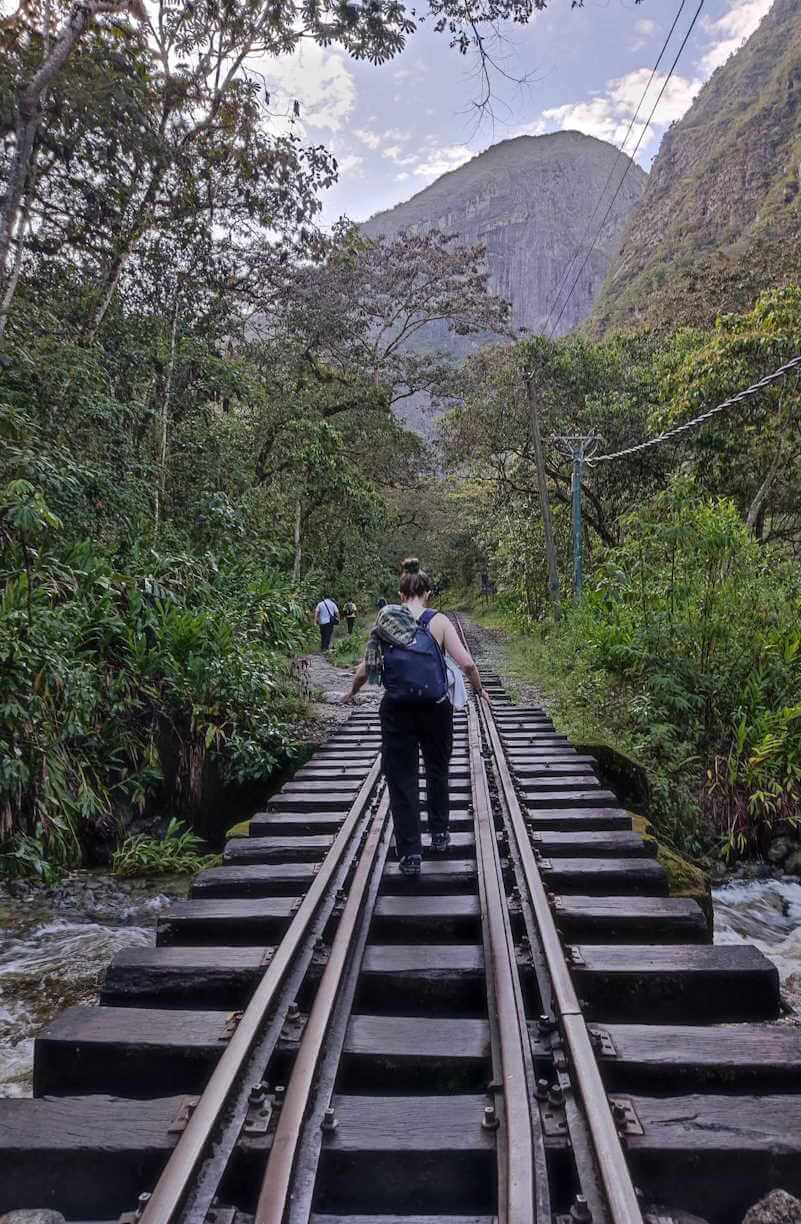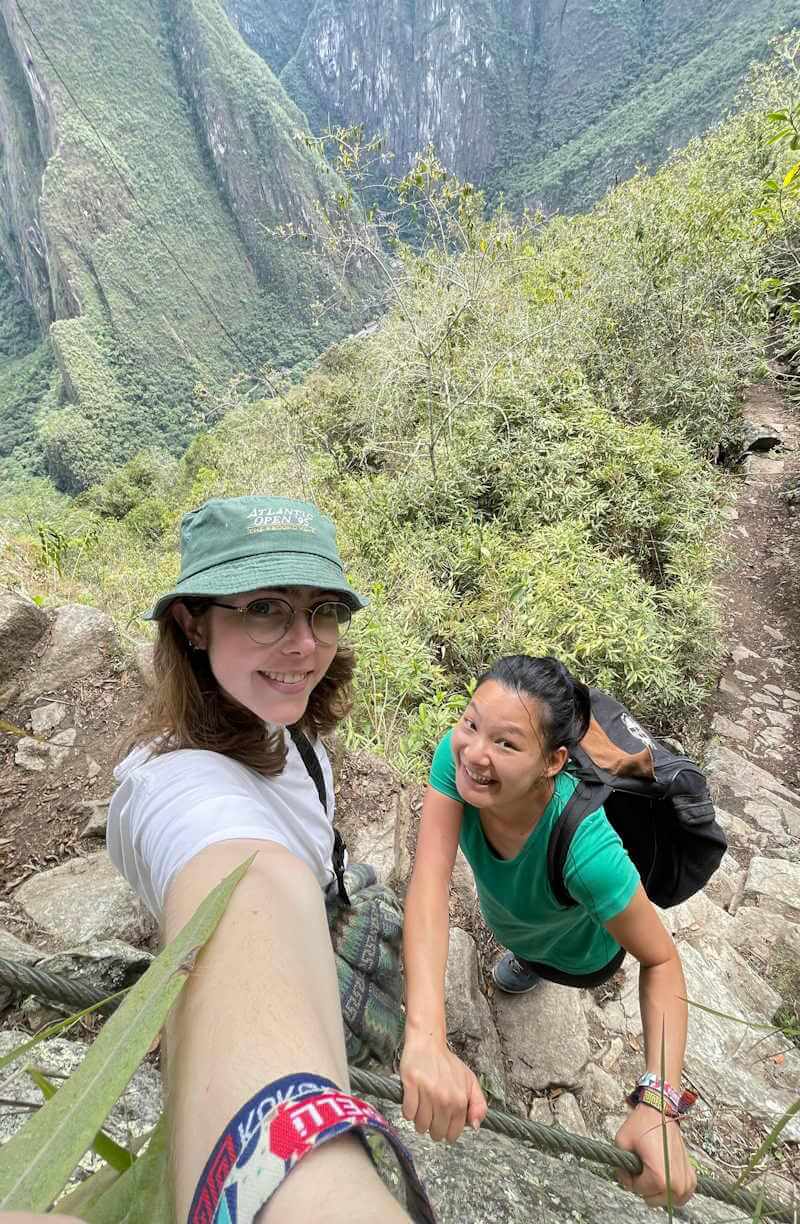
By Evangeline Yong
Travel Writer10 Aug 2023 - 5 Minute Read
We are stuck at a roadblock on our way to Machu Picchu, and our taxi driver, Wilbert, is up a tree picking mangoes.
“We’re screwed,” I say.
“We’ll figure something out,” says Brendan, and bites into a mango as if it were an apple.
We wait on a strip of tarmac between chartreuse-green jungle and sun-bronzed cordilleras. Protestors with taut faces and anxious eyes cluster around a roadblock of boulders, logs and branches. The women wear bowler hats and bolleras, wide skirts with intricate rainbow trimmings. The men are in baseball caps and football shirts, conferring in Quechua and Spanish. Instead of weapons, they carry hand-painted signs calling for unity and an end to corruption. Watching them, I am split between frustration at the delay, and guilt at my sense of entitlement. This is our summer; this is their life.
“Quieres uno?” Wilbert tosses another mango towards us. I shake my head. I don’t understand the lack of urgency, the way time has swelled to a stop, how unfazed everyone is.
I’m travelling with Bets, a friend from Melbourne, and two Irish backpackers, Brendan and Brian. We met at a hostel in Cusco, connecting over games of beer pong and conversations covering everything from Spanish imperialism to Ireland’s best surf beaches. Brendan and Brian are both engineers, fluent in logic and Spanish; Bets is a data scientist with a contingency plan for every situation. Between them they have all the common sense and calm that I lack.
Our travels in Peru have coincided with the president’s arrest, landing us in the middle of nationwide demonstrations, train strikes and roadblocks. Because of this, we’re taking the road less travelled to Machu Picchu: an unofficial taxi down the back roads of Peru’s mountainous south.
Our plan is simple: drive five hours from Cusco to a power station called Hidroeléctrica, the closest you can get to the Incan citadel by car. Hike two hours and stay overnight at Aguas Calientes, the nearest town to Machu Picchu. See Machu Picchu at dawn and drive back to Cusco with plenty of time to spare before Bets and I fly out of Peru.
What could possibly go wrong?
* * * * *
The shadows are lengthening on the tarmac by the time the protestors clear the roadblock and disperse, shouting “Viva el paro!” The locals join in the chorus, leaning against their car horns and cheering. The noise ricochets through the air, breaking the tension of hours of waiting. We pile into Wilbert’s Toyota Yaris, a well-loved 2005 model. Wilbert floors the accelerator.
In the car, Bets and Brian swap travel stories while Wilbert and Brendan canvass politics, history and sport. Wilbert is well-informed and diplomatic, giving nuanced responses to Brendan’s questions. His phone vibrates once a minute – he is part of a WhatsApp group of local taxi drivers who trade insider information about the demonstrations, staying well ahead of the official sources.
The terrain gains gravitas, the road curving and contracting as we ascend into the Andes. At 4,000 meters above sea level, we pass through low-hanging cumulus. Statuesque mountains soar and plunge into sun-drenched plateaus, where the Urubamba River, powered by glacial melt, pounds and pummels its way towards the Amazon. After a few hours, we emerge into the high jungle, humid cloud forests of fern and rhododendron. The sun sets subtly, black curling around blue. Tarmac deteriorates into gravel and dust.
We stop for dinner at a restaurant in Santa Teresa, a town half an hour’s drive from Hidroeléctrica. It’s too dark to hike anywhere tonight. I call the airline to reschedule our flights. Wilbert translates. After two hours on hold, we are told that we cannot reschedule. Brian does some quick Googling and discovers that the trains from Aguas Calientes to Cusco are running again. Bets and I can catch the 1pm train tomorrow, arriving back in time for our evening flights.
There is a tense choreography to arriving at a strange house after midnight. We tiptoe around the kittens sleeping on the stairs.
I try to buy tickets online, but my card doesn’t work. Neither does Bets’.
Brendan pays. Brian speaks to the restaurant owner who recommends a friend’s place where we can shower and sleep. He closes the restaurant and walks us over, his flashlight parrying the dark.
There is a tense choreography to arriving at a strange house after midnight. We tiptoe around the kittens sleeping on the stairs. A grasshopper sidesteps the shower drain. I jump in and out of the ice-cold water.
The bedroom is like a dormitory in a boarding school, five beds in a long sparse room. Brendan’s feet hang off the end of his bed. “Shit,” he mutters under his breath. “This always happens to me.” On the other side of Brendan, Wilbert is snoring, worn out by corkscrew roads and curveball questions. Above us, rain thrums on a tin roof, a grounding, familiar sound.
At four the next morning, five alarms go off in unison. We stumble into the car, still groggy. Just as the sun begins to rise, we reach Hidroeléctrica and begin our hike.
I am running on sheer adrenaline and awe. All around us, the Andes unfurl in lush green billows under lightening skies. We walk in silence, listening to the complex rhythms of wind and river, following the contour of train tracks through fragrant groves of cedar and muña. As we approach Aguas Calientes, the first train of the day thunders past. Brendan raises his fist and cheers.

Our entry tickets to Machu Picchu give us access to different routes around the site, so we say goodbye where our paths diverge. I think how travel gifts strangers with the trust and intimacy of years of friendship – Brendan’s credit card details on my phone, the precise cadence of Wilbert’s snores in my head. I wonder how Andean icecaps become Amazonian river-water, thousands of kilometres south; how five people from three corners of the world coincide at a singular point in space and time. I think how we will probably never see each other again, and I must say something meaningful, but the words wedge in my throat. We hug, turn and walk away.
Bets and I climb to the top of Huchuy Picchu, one of the viewpoints above Machu Picchu. The air is warm and viscous like honey. Butterflies drift past, trailing silken wings. Below, terraces and towers of stone rise against mountains crowned with clouds.
Bets opens her backpack and hands me a mango – golden, ripe, bursting at the seams. I take a bite. Time swells to a stop, but for once, I couldn’t care less.

Discover similar stories in
connection
Travel Writer
Evangeline Yong was a winner of the World Nomads Travel Writing Scholarship 2020. She’s currently based in Melbourne, Australia, studying law and Spanish at university.



No Comments